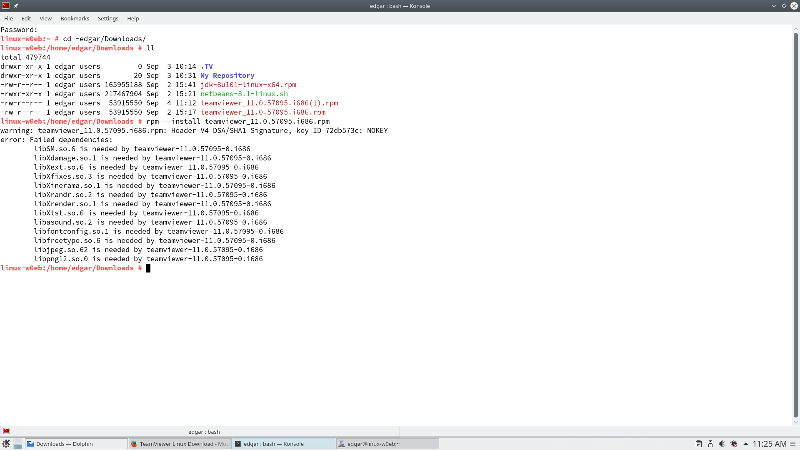Linux
--
Questions
--
Followers
Top Experts

It appears as though the software manager is looking for a list, and that the list is missing from the RPM package file.
I saw an article suggesting that if I right-click on the RPM file name in the folder view, the pop-up menu should include an option to install the file. There is no such option on the menu. Perhaps that's because I'm not logged in as root – although I don't know why that would matter because the system could simply prompt me for root's password.
When I use the command line, the RPM complains about missing dependencies:

I'm assuming that if I can use the GUI, the software manager will automatically install any missing dependencies. Alternatively, from the command line, I could specify the "nodeps" option. However, I'm not sure that would result in a viable executable.
In the past, I have succeeded at installing this software! Unfortunately, I don't recall the steps I took. So, I don't remember whether it was via the GUI or the command line.
Zero AI Policy
We believe in human intelligence. Our moderation policy strictly prohibits the use of LLM content in our Q&A threads.
1. Make sure your Kernel is up-to-date. You can update this with YAST or another tool. You must restart the system upon installation.
2. No, RPM does not always install dependencies - you have to go back and do them.
I was not suggesting that RPM will resolve and install dependencies. Use of the "nordeps" option ignores dependencies.
When I've used YaST2 in the past to install software, it will identify and install dependencies – when it can find them.
When I download the file, one of the options I'm given is to open it with Ark. perhaps I'll try that route to see where it takes me.






EARN REWARDS FOR ASKING, ANSWERING, AND MORE.
Earn free swag for participating on the platform.

Get a FREE t-shirt when you ask your first question.
We believe in human intelligence. Our moderation policy strictly prohibits the use of LLM content in our Q&A threads.
zypper ps
They've ID'd services that needed restarts after patching for a few years now. That's one of the nice things about SUSE as well as their default Xen setup in the installs.
zypper ps makes it more "complete" than apt-get or yum. Debian does have a separate check-restart in debian-tools, but it's separate from apt.
Linux
--
Questions
--
Followers
Top Experts
Linux is a UNIX-like open source operating system with hundreds of distinct distributions, including: Fedora, openSUSE, Ubuntu, Debian, Slackware, Gentoo, CentOS, and Arch Linux. Linux is generally associated with web and database servers, but has become popular in many niche industries and applications.